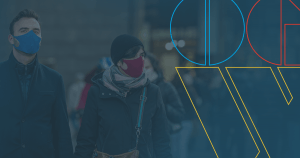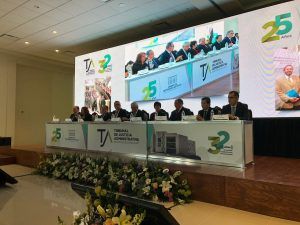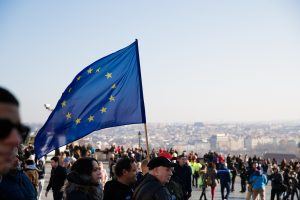Should the EU Stop Funding Autocrats? A Democracy Debate
¿Debería la UE dejar de financiar a autócratas? Debate sobre democracia
The Democracy Debates is a new multi-stakeholder forum for debating policies and politics impacting democracy. Led by the Open Governance Network for Europe with support from Carnegie Europe and the European Partnership for Democracy, the Democracy Debates will regularly convene European policymakers and politicians with civil society, academics, and philanthropists to debate and discuss ideas for democratic solutions to shared problems facing our democratic values, systems, and societies.
The international community had long praised and supported autocratic countries like Rwanda and Ethiopia for their economic growth, but arguments for authoritarian development have been called into question, most recently, for example, with the eruption of violent conflict in the northern Tigray region of Ethiopia in November 2020. Can authoritarian models of governance truly deliver on development in a peaceful and sustainable manner? In this context, the question emerges: Should the EU stop funding autocrats? To help answer this, the Open Governance Network for Europe, Carnegie Europe, and European Partnership for Democracy convened a Democracy Debate to hear from experts on both sides. Here’s what they said:
The argument in favor of aidMore and better information about aid helps partner countries and donor institutions plan and manage aid resources more effectively, parliaments and civil society to hold governments accountable for t... cessation centers on signaling and accountability. Perhaps most obviously, the European Union (EU) undermines its commitmentOGP commitments are promises for reform co-created by governments and civil society and submitted as part of an action plan. Commitments typically include a description of the problem, concrete action... to democracy by providing aid to authoritarian regimes. Nic Cheeseman pointed out that, despite a shrinking budget, “we still see some of the largest aid disbursements going to authoritarian regimes.” By continuing to fund them, the EU risks legitimizing dictatorships. Moreover, in an environment lacking accountability, autocrats may well redirect the money toward their own efforts at retaining power. The EU’s self-proclaimed values are thrown into question when it continues to funnel money to regimes that every day commit human rightsAn essential part of open government includes protecting the sacred freedoms and rights of all citizens, including the most vulnerable groups, and holding those who violate human rights accountable. T... abuses and suppress civil society actors striving for political representation for all.
On the other side, the argument against the total withdrawal of aid emphasizes urgency and need, as well as geopolitical rivalry. Due in part to the pandemic’s devastating social and economic effects, the need for aid is enormous and increasing. Change agents—both inside and outside of civil society and government—need support. Aid cessation risks cutting off people in these countries who are struggling for democratic reform. Like blanket sanctions, blanket aid withdrawal may ultimately punish citizens instead of the regime. As Christine Meisler explained, “these are often fragile states threatening a violent conflict, and in these cases aid is often a stabilizing factor to avoid more insecurity and violence for the most vulnerable.” Furthermore, the total withdrawal of funding can actually make regimes more brutal and give them an excuse to clamp down harder on civil society actors. Finally, a disengaged EU could also translate to other global powers like China or Russia coming in to ‘fill in the gaps’.
To avoid abetting authoritarianism while also supporting democratization efforts and providing humanitarian aid, civil society representative Maureen Kademaunga said that the EU must strike a balance. To enhance accountability, as it has begun to do inside its borders with rule of law conditionality for funding, the EU should engage more critically, ask tougher questions to autocrats and not simply trust that aid money will end up in the appropriate hands. Close monitoring and risk analysis for misuse of support and human rights violations should be conducted in detail. Maureen suggested, “as an activist in Africa, I would love to see funding from the EU being directed towards programs that give agency to the people.” Indeed, it is essential to include more (and more diverse) civil society actors to avoid mismanagement of funds, negative human rights effects, and corruption. Still, the state should not be entirely excluded as a recipient of funds, so as to incentivize civil society and government to work toward the same goal and to avoid harming state institutions that support democracy and good governance.
Looking ahead, positive conditionality and more targeted support offer promising tools for improvement. Positive conditionality shifts focus from punishment for bad behavior to reward for good behavior. This instrument may give authoritarian regimes more compelling incentives to democratize. More targeted, personalized support and/or sanctions can refocus funds toward trusted agents working on political reform. Further, A recent guide from the Open Government PartnershipThe Open Government Partnership (OGP) is a multi-stakeholder initiative focused on improving government transparency, ensuring opportunities for citizen participation in public matters, and strengthen... More shares tools for embedding transparencyAccording to OGP’s Articles of Governance, transparency occurs when “government-held information (including on activities and decisions) is open, comprehensive, timely, freely available to the pub... More, accountability, and citizen participationAccording to OGP’s Articles of Governance, citizen participation occurs when “governments seek to mobilize citizens to engage in public debate, provide input, and make contributions that lead to m... More into the management of international aid. Through these approaches, the EU can avoid complicity in human rights violations while empowering citizens to decide their own futures. However, a remaining obstacle to these solutions exists in repressive laws that block civil society from receiving funding. In many cases, the EU will have to figure out how to navigate these laws and get money into the hands of the people. Ultimately, outstanding questions relate less to the reduction of aid and more to the specifics of how this money can be most effectively repurposed.
For more takeaways from the Democracy Debate series, see ‘Does Europe suffer from too much polarization, or too little? A Democracy Debate’.
Democracy Debates (Debates sobre democracia) es un nuevo foro multisectorial diseñado para debatir las políticas y los procesos políticos que impactan la democracia. Con el liderazgo de la Open Governance Network for Europe (Red de Gobernanza Abierta de Europa) y con el apoyo de Carnegie Europa y de European Partnership for Democracy (Alianza Europea para la Democracia), Democracy Debates reunirá a tomadores de decisiones y políticos de Europa con la sociedad civil, academia y filántropos para debatir y discutir ideas de soluciones democráticas a los problemas que enfrentan los valores, sistemas y sociedades democráticas.
Desde hace mucho tiempo, la comunidad internacional ha elogiado y apoyado a países autócratas como Ruanda y Etiopía por su crecimiento económico, pero más recientemente, en el marco de los conflictos violentos que han surgido en la región de Tigray en el norte de Etiopía en noviembre de 2020, se han cuestionado argumentos alrededor del desarrollo autoritario. ¿Los modelos autoritarios de gobernanza pueden realmente cumplir con los objetivos de desarrollo de forma pacífica y sostenible? En ese sentido, surge la pregunta: ¿Debería la Unión Europea financiar a los autócratas? Para ayudar a responder esta pregunta, Open Governance Network for Europe, Carnegie Europa y European Partnership for Democracy organizaron un debate sobre democracia con expertos con ambas posturas. A continuación presentamos un resumen de lo discutido.
El argumento a favor de suspender la asistencia se enfoca en dejar clara la postura y en la rendición de cuentas. Quizá el argumento más obvio es que la Unión Europea (UE) desvirtúa su compromiso con la democracia al ofrecer asistencia a regímenes autoritarios. Nic Cheeseman señaló que, a pesar del presupuesto cada vez menor, algunos de los desembolsos más importante están destinados a regímenes autoritarios”. Al seguir financiándolos, la UE se arriesga a legitimar a dictadores. Además, en un ambiente en donde no existe la rendición de cuentas, los autócratas podrían redirigir los recursos a sus propios esfuerzos y retener el poder. Los valores de la UE quedan en tela de juicio cuando canalizan recursos a regímenes que todos los días cometen abusos a los derechos humanos y reprimen a los actores de la sociedad civil que están luchando a favor de la representación política de todos.
Por otra parte, el argumento en contra de la retención total de la asistencia enfatiza argumentos de urgencia y necesidad, además de las rivalidades geopolíticas. Debido en parte a los efectos económicos y sociales devastadores que ha tenido la pandemia, la necesidad de la asistencia es enorme y cada vez mayor. Los agentes de cambio, dentro y fuera del gobierno, requieren de apoyo. Suspender la asistencia podría debilitar a las personas de estos países que están luchando por las reformas democráticas. Como las sanciones totales, la suspensión total de la asistencia podría castigar a la ciudadanía y no a los regímenes. Como lo explicó Christine Meisler, “estamos hablando de estados frágiles con amenaza de conflictos violentos y en estos casos la asistencia es un factor estabilizador que reduce la inseguridad y violencia para los más vulnerables.” Además, la suspensión total de los fondos podría hacer que los regímenes sean aún más violentos y darles una excusa para restringir aún más a actores de la sociedad civil. Finalmente, la desvinculación de la UE podría llegar a otras potencias mundiales como China o Rusia que están “llenando los vacíos”.
Con el fin de evitar la complicidad con el autoritarismo y al mismo tiempo apoyar los esfuerzos de democratización y ofrecer asistencia humanitaria, la representante de la sociedad civil Maureen Kademaunga comentó que la UE deberá lograr un equilibrio. Para fortalecer la rendición de cuentas, como lo ha hecho al interior sus fronteras con un Estado de derecho como condición para otorgar fondos, la UE deberá ser más crítica, plantear preguntas más estrictas a los autócratas y no simplemente confiar que la asistencia llegará a las manos adecuadas. Será necesario llevar a cabo un monitoreo cuidadoso y un análisis de riesgos de usos indebidos del apoyo y las violaciones de los derechos humanos. Mareen sugirió, “como activista en África, me encantaría ver fondos de la UE dirigidos a programas que dan poder a la gente”. Ciertamente, es fundamental incluir a más actores de la sociedad civil para evitar malos manejos en el uso de los fondos, efectos negativos en los derechos humanos y corrupción. Aun así, el Estado no deberá ser excluido como beneficiario de los fondos para incentivar que la sociedad civil y el gobierno trabajen hacia un objetivo conjunto y evitar debilitar a las instituciones que apoyan la democracia y la gobernanza.
En el futuro, algunas herramientas prometedoras son la condicionalidad positiva y el apoyo mejor dirigido. La condicionalidad positiva cambia el enfoque desde un castigo por malos comportamientos hacia recompensar las buenas prácticas. Este instrumento podría dar a los regímenes autoritarios mejores incentivos para fortalecer la democracia. El apoyo mejor dirigido y más personalizado y/o las sanciones podrían redirigir los fondos en agentes confiables que están trabajando en reformas políticas. Además, la guía que recientemente publicó Open Government Partnership ofrece una serie de herramientas para incluir la transparencia, rendición de cuentas y participación ciudadana en el manejo de la asistencia internacional. Así, la UE puede evitar ser cómplice con violaciones a los derechos humanos y empoderar a la ciudadanía a tomar decisiones sobre su futuro. Sin embargo, persiste el obstáculo de las leyes represivas que bloquean el flujo de fondos a la sociedad civil. En muchos casos, la UE deberá decidir cómo navegar estas leyes y llevar el dinero a las personas. Finalmente, las preguntas a plantear se relacionan menos con la reducción de la asistencia y más con cómo redirigirla efectivamente.
No comments yet
Related Content

A Guide to Open Government and the Coronavirus: International Aid
The COVID-19 pandemic has strained healthcare systems, weakened economies, and deepened inequalities. In response, development partners are mobilizing assistance through grants, loans, debt relief, and other forms of official development…

Open Gov Week 2021
From May 17-21, join open government champions from around the world to share ideas, discuss solutions, and commit to new levels of citizen participation in government to respond to and…

Partnerships and Coalitions
OGP convenes and participates in different coalitions and thematic groups to advance a range of issues including beneficial ownership transparency, water, and gender. OGP has also signed agreements with key…


Leave a Reply